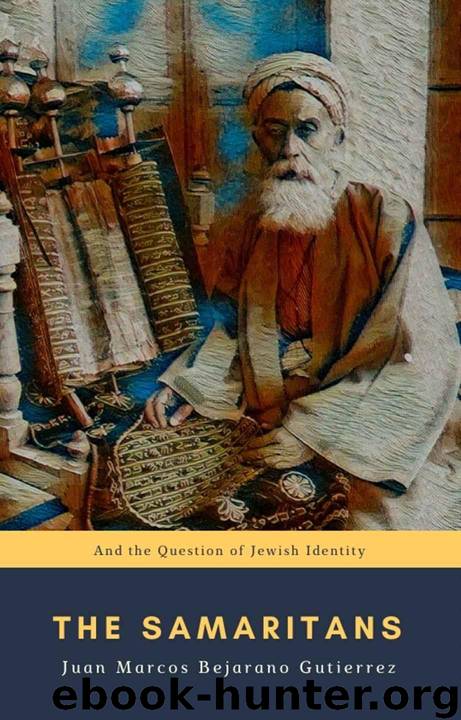The Samaritans: And the Question of Jewish Identity by Juan Marcos Bejarano Gutierrez

Author:Juan Marcos Bejarano Gutierrez
Language: eng
Format: azw3
Publisher: Yaron Publishing
Published: 2020-03-03T23:00:00+00:00
“Now these cutheans do tithe their produce in the proper way since they are very scrupulous about any injunction written in the Torah; for a Master has said: Whenever the Cutheans have adopted a mitzvah, they are much more particular with it than the Jews.”
But a degree of suspicion remained. Mishnah Berachot 8:8 states:
“If wine were brought to them after the meal, and only that cup were there, Beth Shammai say: He blesses on the wine, and then he says grace [for grace does not require a cup]; and Beth Hillel say: He says grace and then blesses on the wine, [Beth Hillel holding that grace requires a cup.] One answers "Amen" after a Jew who has made a blessing [even if he did not hear the "Name," but only the end of the blessing; for it may be assumed that the blessing was "for Heaven"]; but one does not answer "Amen" after a Cuthite who has made a blessing unless he has heard the entire blessing [lest he made the blessing to Mount Gerizim.]”
The Talmud also discusses a topic that would ultimately be of concern with regards to Conversos- the handling of wine. Wine handled by a non-Jew was a significant concern as wine libations were prominent in pagan worship and would render the wine unfit for use by Jews. Tractate Avodah Zarah relates Jews could not derive any benefit from ordinary wine produced by non-Jews. Jewish wine left under the care of a non-Jew rendered it unfit for Jewish use, but a Jew could still derive benefit from it. There was also discussion regarding wine under the supervision of a Samaritan. The concern was not over the possibility that they were pagans, but rather that they were not as particular about an idolater coming in contact with the wine as Jews would have been. The same concern would arise with regards to non-Jews handling wine under the supervision of Conversos.[45]
Even though the Talmud states that Samaritans were to be considered as avdei kochavim gemurim or as ki'goyim gemurim, implications of this stance are not entirely clear. Tractate Avodah Zara relates the question of circumcision in a town where no Jew was available. If an idolater and Samaritan were present, Rabbi Meir and Rabbi Judah disagreed whether the former or the latter should be allowed to perform the circumcision. The Samaritans it was feared circumcised in honor of a sacred object located on Mount Gerizim.[46]
Were Samaritans considered as Jewish idolaters, or as non-Jews? In the end, the Gemara determined that Samaritans held the status of non-Jews. Rabbi Linzer noted that the Samaritan dilemma led some Geonim to state that the children of an apostate lose their Jewish status completely. The rationale for this view was based on the belief that such people will almost certainly lose their Jewish identity and be permanently lost.[47] While this view was generally rejected by halakhah, the Samaritans were treated as exceptions since they ultimately saw themselves as practicing a different religious tradition and maintained a distinct identity than that of Jews.
Download
This site does not store any files on its server. We only index and link to content provided by other sites. Please contact the content providers to delete copyright contents if any and email us, we'll remove relevant links or contents immediately.
Genius & Anxiety by Norman Lebrecht(802)
A Chosen Few by Mark Kurlansky(781)
Going Home by Raja Shehadeh(679)
Righteous Victims by Benny Morris(672)
A history of Zionism by Walter Laqueur(668)
The Aleppo Codex: A True Story of Obsession, Faith, and the Pursuit of an Ancient Bible by Matti Friedman(665)
The War Against the Jews: 1933–1945 by Lucy S. Dawidowicz(646)
Complete Works of Josephus by Josephus(620)
The Israel-Arab Reader by Walter Laqueur(587)
Legacy by Thomas Harding(579)
Rome and Jerusalem : the clash of ancient civilizations by Goodman Martin 1953-(575)
The Rise of the Roman Empire (Classics) by Polybius(561)
We Stand Divided by Daniel Gordis(539)
Tehran Children by Mikhal Dekel(513)
The Secret History by Procopius(513)
A History of Zionism by Walter Laqueur(507)
Ethics (Translated & Annotated) by Baruch Spinoza(502)
Jewish Terrorism in Israel by Pedahzur Ami & Arie Perliger(499)
Hitler's First Victims by Timothy W. Ryback(491)
